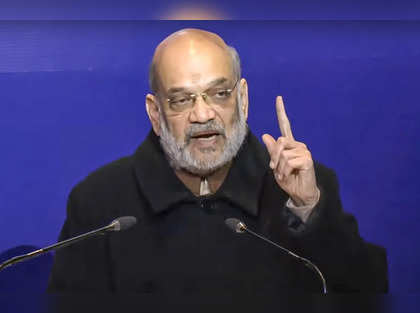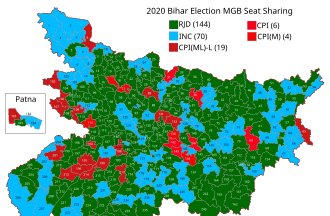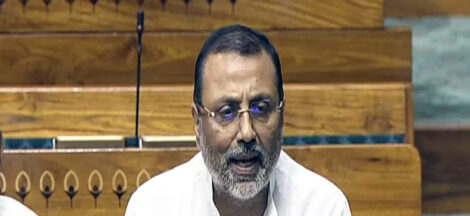By Dr. Gyan Pathak
It is only after a week of Uddhav Thackeray’s ‘Saamana’ praising its political adversary BJP leader and Chief Minister of the state Devendra Fadnavis and a reported reunion efforts between the NCP factions led by Ajit Pawar and Sharad Pawar, Union Minister of Home Amit Shah has said about the end of ‘Politics of Betrayal’, overtly referring to Sharad Pawar and Uddhav Thackeray, but covertly targeting its own allies in general across the country, and Eknath Shinde and Ajit Pawar in particular in Maharashtra by reminding them about the end result, in case they try to betray the BJP. It indicates Maharashtra politics is still very active beneath the surface, especially after announcement of the election result on November 23.
Addressing a State BJP convention in Shirdi, Amit Shah said, “The victory (of BJP) in Maharashtra ended the politics of instability and backstabbing started by Sharad Pawar in 1978. You (people) have buried such politics 20-foot in the ground.” He was referring to the incident of 1978, when Sharad Pawar walked out of the Vasantdada Patil government with 40 MLAs and became Chief Minister.
He also said, “Uddhav Thackeray betrayed us. He left the ideology of Balasaheb in 2019. Today you have shown him his place. He became chief minister by treachery.” He was referring the political crisis in Maharashtra of November 2019, when Devendra Fadnavis government was pulled down within five days of taking oath, when one of the NDA ally Shiv Sena led by Uddhav Thackeray broke away and became chief minister of the state on November 28, after joining hands with UPA and forming Maha Vikas Aghadi in Maharashtra.
Amit Shah’s reference to such betrayal is in fact double edged political sword that does not only cuts the opposition leaders Sharad Pawar and Uddhav Thackeray, but also Eknath Shinde and Ajit Pawar. They are indirectly humiliated and threatened. If Amit Shah’s definition of betrayal is based on ditching one’s own political party to become minister, as his rhetoric referred, this is directly applied to Eknath Shinde and Ajit Pawar in Maharashtra, and many other politicians who are now allying with BJP led NDA by ditching their own political parties across the country to become ministers.
It is direct humiliation to all such allies of NDA and their leaders, showing them their ignoble place in BJP’s politics that keeps them always humiliated. Yet again, it is an indirect disclosure of BJP’s real intention that it wants end of “politics of betrayal”, and also a threat that any political party or leader who would betray them, would be shown such an end that Sharad Pawar and Uddhav Thackeray met.
It should be noted that as per the definition betrayal given by Amit Shah, Eknath Shinde ‘betrayed’ Shiv Sena and became chief minister on June 30, 2022, while Ajit Pawar betrayed NCP and its leader and his uncle Sharad Pawar on July, 2023 to become a minister in the NDA government of Maharashtra led by Chief Minister Eknath Shinde.
There are greater questions involved regarding the real nature of the BJP and its leaders. The current statement of Amit Shah shows the rank hypocrisy – which on the one hand decry the political betrayal of the political parties and their leaders who are not allies of the BJP, but rewards such leaders if they join hands with them after the betrayal. Maharashtra itself is the best example, but the phenomenon is pan-India.
The million-dollar question is why Amit Shah chose to use the term “politics of betrayal” at this point of time? The answer to this question perhaps lies in the political development in the state after declaration of result of the assembly election on November 23. Election was fought by Mahayuti under the leadership of Eknath Shinde, and it was expected that he would be chief minister after Mahayuti win. Mahayuti won, but BJP betrayed and denied him the CM post, because BJP emerged as largest political party. Shinde had to resign from CM post on November 26, 2024, when the term of the Vidhan Sabha expired.
Maharashtra went without new government for 10 days, and finally on December 5, BJP’s Devendra Fadnavis was sworn in as Chief Minister. Maharashtra cabinet could be formed only on December 15. The delay was chiefly because Shiv Sena leader Eknath Shinde, and NCP leader Ajit Pawar were not able to stomach the humiliation they received on account of the BJP’s behaviour. Nevertheless, they had to agree to the BJP’s highhandedness which resorted to a new political game in violation to the Coalition Dharma.
This put the political tension on the surface within Mahayuti to rest, but the tense activities continued underneath. It has disturbed the BJP and its leader Amit Shah, which prompted him to serve the indirect threat via attacking Sharad Pawar and Uddhav Thackeray referring to the “politics of betrayal”.
The week past in Maharashtra politics was full of buzz of reconciliation efforts between the two split up Shiv Sena groups led by Eknath Shinde and Uddhav Thackeray, and also between the two split up NCP groups led by Ajit Pawar and Sharad Pawar. It heightened the threat perception of the BJP. There has also been reports that Shiv Sena (UBT) has made efforts of reconciliation with the BJP by admiring BJP leader and Chief Minister Fadnavis. Some reports also suggested that Sharad Pawar and Uddhav Thackeray are not happy in the INDIA bloc. All these are indicative of intense underground political activities in Maharashtra, though Amit Shah’s statement has also clear message to all its allies across the country, from Bihar to Andhra Pradesh. (IPA Service)




 Vatican Appointing Simona Brambilla As Prefect Is Of Historic Significance
Vatican Appointing Simona Brambilla As Prefect Is Of Historic Significance 